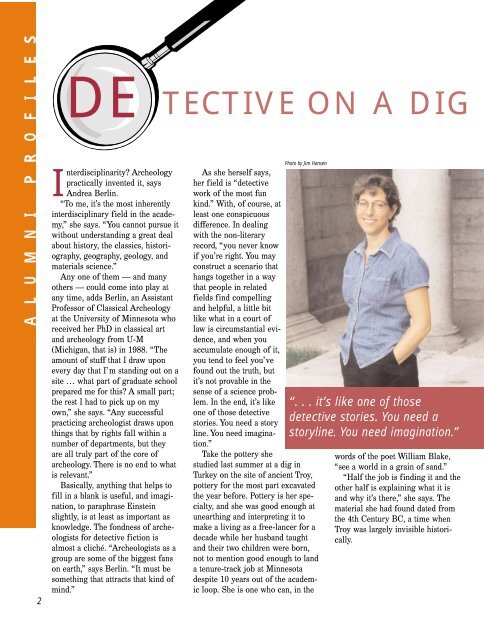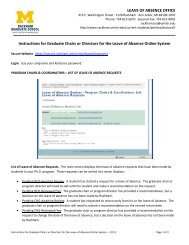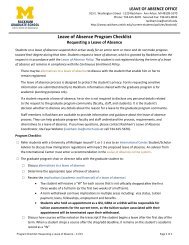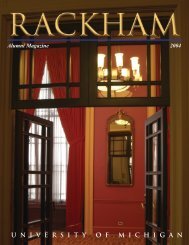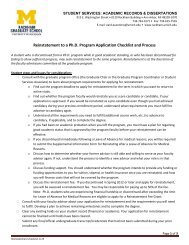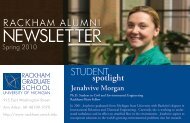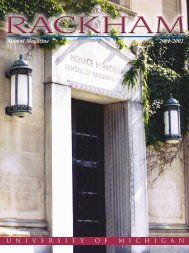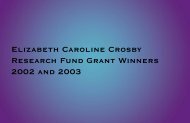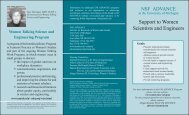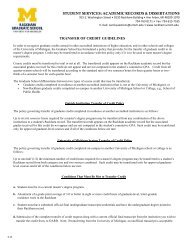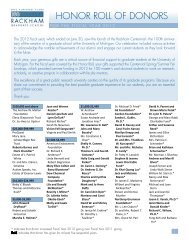A L U M N I P R O F I L E S2DEInterdisciplinarity? Archeologypractically invented it, saysAndrea Berlin.“To me, it’s the most inherentlyinterdisciplinary field in the academy,”she says. “You cannot pursue itwithout understanding a great dealabout history, the classics, historiography,geography, geology, andmaterials science.”Any one <strong>of</strong> them — and manyothers — could come into play atany time, adds Berlin, an AssistantPr<strong>of</strong>essor <strong>of</strong> Classical Archeologyat the <strong>University</strong> <strong>of</strong> Minnesota whoreceived her PhD in classical artand archeology from U-M(<strong>Michigan</strong>, that is) in 1988. “Theamount <strong>of</strong> stuff that I draw uponevery day that I’m standing out on asite … what part <strong>of</strong> graduate schoolprepared me for this? A small part;the rest I had to pick up on myown,” she says. “Any successfulpracticing archeologist draws uponthings that by rights fall within anumber <strong>of</strong> departments, but theyare all truly part <strong>of</strong> the core <strong>of</strong>archeology. There is no end to whatis relevant.”Basically, anything that helps t<strong>of</strong>ill in a blank is useful, and imagination,to paraphrase Einsteinslightly, is at least as important asknowledge. The fondness <strong>of</strong> archeologistsfor detective fiction isalmost a cliché. “Archeologists as agroup are some <strong>of</strong> the biggest fanson earth,” says Berlin. “It must besomething that attracts that kind <strong>of</strong>mind.”TECTIVE ON A DIGPhoto by Jim HansenAs she herself says,her field is “detectivework <strong>of</strong> the most funkind.” With, <strong>of</strong> course, atleast one conspicuousdifference. In dealingwith the non-literaryrecord, “you never knowif you’re right. You mayconstruct a scenario thathangs together in a waythat people in relatedfields find compellingand helpful, a little bitlike what in a court <strong>of</strong>law is circumstantial evidence,and when youaccumulate enough <strong>of</strong> it,you tend to feel you’vefound out the truth, butit’s not provable in thesense <strong>of</strong> a science problem.In the end, it’s likeone <strong>of</strong> those detectivestories. You need a storyline. You need imagination.”Take the pottery shestudied last summer at a dig inTurkey on the site <strong>of</strong> ancient Troy,pottery for the most part excavatedthe year before. Pottery is her specialty,and she was good enough atunearthing and interpreting it tomake a living as a free-lancer for adecade while her husband taughtand their two children were born,not to mention good enough to landa tenure-track job at Minnesotadespite 10 years out <strong>of</strong> the academicloop. She is one who can, in the“. . . it’s like one <strong>of</strong> thosedetective stories. You need astoryline. You need imagination.”words <strong>of</strong> the poet William Blake,“see a world in a grain <strong>of</strong> sand.”“Half the job is finding it and theother half is explaining what it isand why it’s there,” she says. Thematerial she had found dated fromthe 4th Century BC, a time whenTroy was largely invisible historically.
Thanks to the Iliad and theOdyssey, “Troy was to theGreeks what Plymouth Rockand the Liberty Bell are to us,” shesays. Ironically, the tales that made itfamous are generally regarded asmythical, while the real life <strong>of</strong> thecity centuries later is ignored. Butfrom what she collected and studied,it seemed clear to Berlin that somethingsignificant was going on.“If somebody had found this material40 years ago,” she says, “theywouldn’t have paid much attention toit, primarily because it wasn’t associatedwith any architecture but alsobecause people didn’t pay muchattention to small finds.”But the notion <strong>of</strong> what is worthy<strong>of</strong> investigation is different now. “Ilooked at all this material, a lot <strong>of</strong> itvery nice, a lot <strong>of</strong> it imported fromAthens, and I simply asked what’s itdoing here and what does it mean?”It was clearly not locally produced,and clearly not intended for householdutility.“You can’t have all this materialhere without somebody bringing it,”she says. “Why did they bring ithere? Why then? Why in this space?What is happening in the middle <strong>of</strong>the 4th Century? What is the connectionbetween Troy and Athens, whichis a sea away?”Cue the knowledge <strong>of</strong> history. Cuethe imagination. “The long and short<strong>of</strong> it is that this was the period whenPhilip II <strong>of</strong> Macedon, Alexander theGreat’s father, was threatening totake away the independence <strong>of</strong> theGreek world and Athens was castingherself in the role <strong>of</strong> the savior <strong>of</strong>Greece and invoking the help <strong>of</strong>many <strong>of</strong> her daughter cities, hercolonies, one <strong>of</strong> which was a city justa morning’s walk away from Troy.Athens anchored her navy there for atime, probably because it was a safeplace, out <strong>of</strong> the reach <strong>of</strong> Philip.”But the area was strategicallyimportant for other, less tangible,reasons, Berlin believes. “I thinkTroy was suddenly very helpfullybeing invoked as a prestigious symbol<strong>of</strong> Greek military hegemony andpolitical prominence,” she says.“Suddenly, in the middle <strong>of</strong> the 4thCentury, in an episode that is unremarkedupon by any contemporaryhistorians, Troy became a symbolagain and people came to visit theshrine at Troy and they brought dedications,and that’s what we found,their dedications.”“The need <strong>of</strong> the Athenians toinvoke not only actual militarystrength but also old symbols lendsmore depth to their fight againstPhilip, a fight they lost. The fact thatTroy and the sagas associated with itbecame important suddenly at thattime tells you two things. One is thatthey were not some constant part <strong>of</strong>the Greek self-consciousness or elsethere would have been evidence <strong>of</strong>concerted activity and dedications atthe site for the previous hundredyears, and in fact there wasn’t. Theother is that the Athenians apparentlydidn’t hesitate to invoke this powerfulsymbol just when it was necessary,” abehavior that makes them seem verymodern.Like their contemporary counterparts,they had no qualms aboutwrapping themselves in the flag, as itwere. Such an insight not only addsto our understanding <strong>of</strong> these people,but also makes them seem lessremote, less alien to ourselves.“This is an episode that nobodyknew about because nobody in antiquitywrote about it,” says Berlin,“and if we hadn’t found this material,nobody would know about it yet.Photo by Sharon HerbertAnd also if nobody bothered to lookat the material and ask what it wasdoing there and look for a contextthat would explain it. That is myfavorite thing to do. Nothing givesme a bigger charge than that.”After all, as she points out, “historyis made by everybody all <strong>of</strong> the timeand we are informed in a literarysense <strong>of</strong> about one-half <strong>of</strong> one percent<strong>of</strong> it. What I think I do is putpages back into the history books.” ■3


